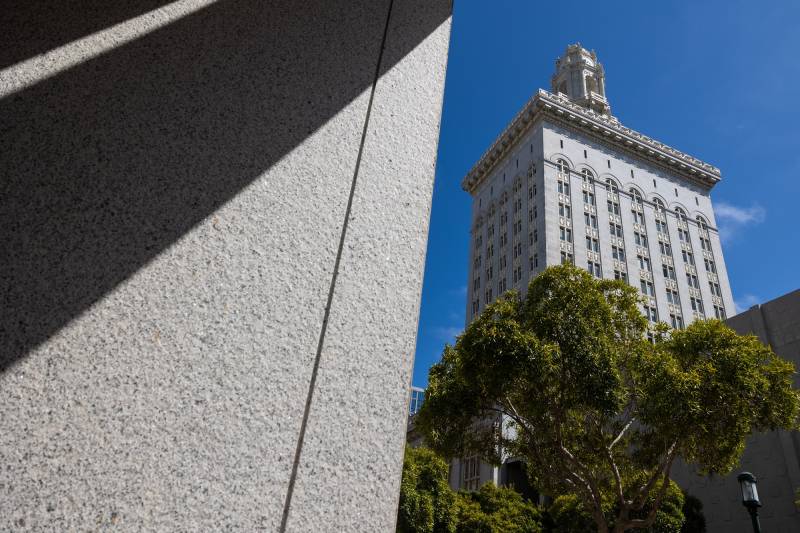Should the sale not go through, council members will have to choose between “stepping on the brake pedal versus pulling the emergency brake,” budget administrator Bradley Johnson said during the hearing.
Mayor Sheng Thao’s contingency plan
The proposal introduced by Thao’s office uses one-time funds from the Coliseum, helping reduce Oakland’s existing budget deficit, which is more than $100 million. But if the money doesn’t become available this fall, a contingency plan will go into effect with severe cuts.
The biggest would come from public safety departments, including brownouts, or rotating shutdowns, of five fire engine companies, allowing the number of sworn police officers to shrink from 709 to about 600 through attrition and freeze or eliminate violence prevention positions.
“It is going to have a major impact on my ability to cover patrol shifts and provide basic response services to the citizens of Oakland,” Police Chief Floyd Mitchell told council members on Friday.
The contingency plan would also trigger a citywide halt of hiring, contracting and travel and could lead to a multi-year delay or cancellation of $200 million in planned bond-funded infrastructure, affordable housing, and other projects planned for the coming fiscal year.
Should the funds from the Coliseum sale begin to be available by September, though, these cuts would not be implemented. On Friday, Council President Nikki Fortunato Bas said she was confident that negotiations on the Coliseum sale were on track.
The alternative budget
The council’s other budget option forgoes using Coliseum sale funds from the get-go — with the opportunity to add back services if the funds become available.
That would allow for a “smoother and slightly more flexible” reduction in services than the contingency budget, Johnson said, but it involves similar — though slightly fewer — cuts to public safety resources. One fewer fire engine company would be browned out. and Oakland PD would be able to maintain 10 more sworn officers. Hiring violence prevention positions would be delayed.
This budget plan would also assure that the bond-funded capital investment projects could progress, Johnson said in his presentation.
Where the council stands
Before Friday’s meeting, Councilmember Dan Kalb called the cuts that would have to be made without Coliseum sale funds “horribly draconian.”
“We are making some tough decisions,” he told KQED. “The $63 million allows us to spread that out instead of having to do all of those things now, which would be a huge impact, a huge punch in the gut to the city.”
But Councilmember Janani Ramachandran believes that using those funds would be irresponsible.
“The money that would be sale proceeds from the Coliseum is non-existent at this point,” she told KQED. “We don’t have a deal signed, and we’re nowhere near having a deal signed. Any version of this budget that incorporates $63 million from the sale proceeds of the Coliseum is a non-starter for me.”
Most of the council members expressed concern over the cuts that either the contingency or reduced budget would make to public safety departments. In recent weeks, Oakland has experienced multiple fires, and experts anticipate a busy fire season this summer. Police Chief Mitchell said that the reduced police staffing would have major impacts on the department’s services and the safety of the city.
Adding to turmoil in Oakland
Councilmember Treva Reid blamed Thao for lacking time to review the consequential budgets.
“This budget was ready for our review on May 17, and the mayor, the CEO of our city, elected not to provide the accurate and more truthful budget to be presented for us to have enough time to sufficiently review, make amendments and weigh in,” Reid said. “We are now [within] days of making critical decisions on how we are going to show up and serve our city, and that is thoroughly disappointing.”
The contingency and alternative budget the council is considering were introduced in the days leading up to the special hearing amid a tumultuous time for Oakland — on June 19, 14 people were shot near Lake Merritt after a Juneteenth celebration, and the next morning, FBI agents raided the mayor’s home along with the homes of two members of a politically connected family and the offices of their recycling company. Earlier in June, an effort to recall Thao qualified for the November ballot.
While Bas, Ramachandran and Councilmember Rebecca Kaplan all proposed amendments to the budget on Friday, it’s unclear whether there will be time to make changes to either proposal.

